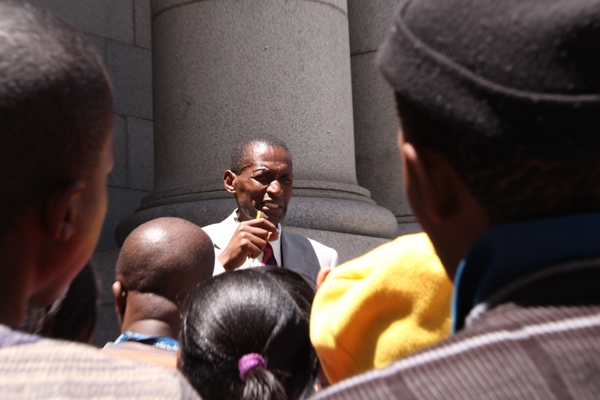Court orders City to conduct census of Marikana

On Thursday, residents of Marikana informal settlement’s Rolihlahla Park section welcomed a Western Cape High Court postponement of an eviction hearing. The court ordered that the City of Cape Town compile an audit of the households living on the erf in question to determine who will need emergency temporary accommodation if an eviction order is granted.
Copper Moon Trading, a private company whose land has been occupied by thousands of shack dwellers in Philippi, will have to wait for a detailed audit of the occupiers and their circumstances before applying for an eviction order.
The Western Cape High Court has ordered that the City of Cape Town count the households on Erf 149, assess the impact that an eviction would have on each of them and report back to the court about the availability of alternative emergency accommodation for those families who would need it. A report back to the court is due on 5 December, after which Copper Moon is allowed to make application for an eviction order.
In August, the Marikana land occupation in Philippi grew exponentially as hundreds of new arrivals erected shacks on the vacant field of privately owned plots off Sheffield Road. The City of Cape Town attempted to contain the occupation through deploying its Anti-Land Invasion Unit. Evictions were met with protests and opposition from shack dwellers, culminating in a day of violent clashes between police and residents on 22 August 2014. Erf 149 is only one of around half a dozen privately owned vacant plots over which the newly expanded informal settlement stretches.
“We are glad, because this means that there will hopefully not be an eviction that will leave our people completely homeless,” said Phillip Mvundlela, chairman for the residents’ committee of people residing on Erf 149.
The group’s legal adviser, Gcinikhaya Ngqaqu said that the community would be briefed on the order and asked to work with City officials tasked with conducting the audit.
“There is suspicion in the community about these officials [because of the evictions in previous weeks]. But, it is important that people understand that their co-operation is now required by a court process.”
The City has been ordered to include a detailed census of the occupants and structures on the property, including details on which households are headed by children, women, disabled or elderly people.
The occupiers are represented by Simon Dippenaar on a pro-bono basis. “This case is not about victory or defeat, it is about what is just and equitable in law,” he said.
“For the court to hear an application for an eviction order before a report and audit of this type is done would be premature. A balance needs to be struck between the constitutional rights of the property owner and of the occupiers. The court’s order is a victory in terms of the process required to ensure that these constitutional rights are being equally protected.”
The City’s mayco member for Human Settlements, Siyabulela Mamkeli, confirmed that the City had noted the court order and were in the process of preparing a “comprehensive report” for the court.
Next: Trade union supported political parties: lessons to be learned
Previous: Zimbabweans can now stay longer for the festive season

This article is licensed under a Creative Commons Attribution-NoDerivatives 4.0 International License.


